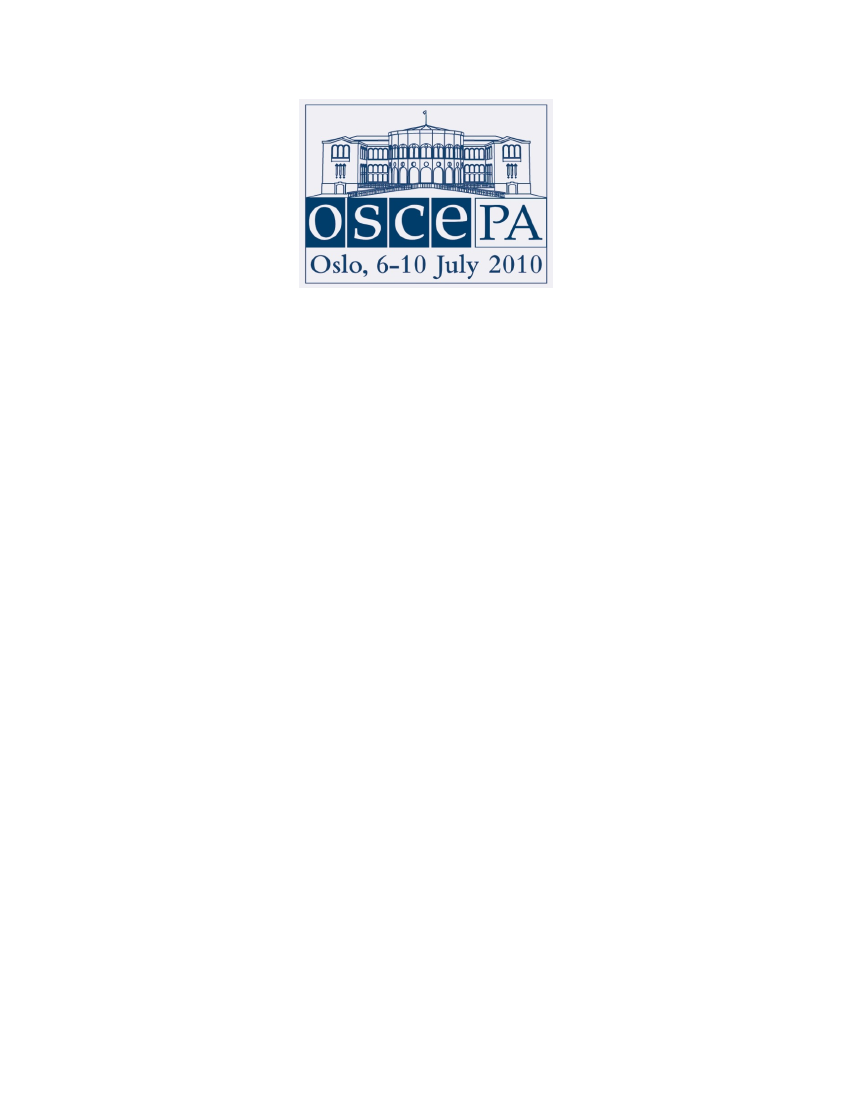OSCEs parlamentariske Forsamling 2009-10
OSCE Alm.del Bilag 37
Offentligt
AS (10) RP 1 EOriginal: ITALIAN
REPORT
FOR THE GENERAL COMMITTEE ONPOLITICAL AFFAIRS AND SECURITY
“RULE OF LAW: COMBATING TRANSNATIONALCRIME AND CORRUPTION”
RAPPORTEURMr. Riccardo MiglioriItaly
OSLO, 6 TO 10 JULY 2010
REPORT FOR THE GENERAL COMMITTEE ON
POLITICAL AFFAIRS AND SECURITY
Rapporteur: Mr. Riccardo Migliori (Italy)
The battle against large-scale organised crime, apart from answering the need for essential moralvalues, means fighting for the defence of democracy against the unjust conditioning of society,the economy, the media and politics.Without a fight against crime in the OSCE area as well, there can be no real security policy, letalone policies for the true protection of fundamental human rights.The figures on the extent of organised crime turnover are staggering and hence too are itsinvasive capacities which are apt to create a 'dirty' economy and 'dirty' politics aimed at negativeand private interests rather than the common good.We need only recall the UN statement that the burden of the criminal economy, in terms of drugtrafficking profits alone, amounts to 2.5% of world GDP.If there is a field in which the indivisibility of security is not only a choice but also a duty that allOSCE countries share, it is the field of a renewed political and legislative fight against crime.We cannot surrender in the face of the fundamental duty to defend the rule of law.There are numerous international documents and agreements that almost all world organisationshave adopted regarding the fight against crime, not to mention the international collaborationbetween Police Forces.On various occasions and at various formal sessions, the OSCE has also made observations andoffered important contributions in this area.Today we believe that the most useful starting point, not as regards abstract sociological analysesbut as regards concrete national legal measures, is the United Nations Convention againstOrganized Crime approved in Palermo between 12th and 15th December 2000.In Palermo, where ten years later, not by chance, our Fall Meetings will convene, theinternational community understood the fundamental concept that Kofi Annan expressedperfectly: “the treaty of Palermo is the demonstration of the international community's will tofind a global response to a global challenge so that if crime can cross borders so will the law.”Thus the objective is clear: the law cannot stop at national boundaries which crime manages topass with ease.
1
This means working for policies that are as transnational as possible in order to seriously take oncriminal activities that are by their nature 'globalized', while the response of our parliaments andgovernments is not 'globalized' to the same extent.Added to which the OSCE area can be defined 'an area of variable legality' because the non-homogeneous nature of our countries' anti-crime legislation leaves open entry points to crime.If this is true and it is, the political purpose of our work is that of bringing our legislation andparliamentary cooperation against crime into line as far as possible. In concrete terms, six OSCEcountries have still not ratified the Palermo Convention. In addition, the UN Convention inPalermo was accompanied by three further Protocols of extraordinary and innovativesignificance.The first Protocol introduced for the first time, in terminology as well as policy, the theme of thefight against the traffic of human beings. Only one OSCE country has not signed the Protocol,but a further five countries have not yet ratified it. The second additional Protocol concerns thestruggle against the smuggling of migrants that seven OSCE countries have not ratified, and onehas not even signed.Finally, the third Protocol regarding the fight against the illicit production and traffic of arms hasnot been signed by sixteen OSCE countries and has not been ratified by another twelve, bringingthe total to 50% of countries adhering to our organisation.It is certain that each of these subjects, even if qualitatively and quantitatively different from oneanother, would merit elaboration.It is nonetheless undisputed that were all our countries to include every principle of the PalermoTreaty and the three additional Protocols in their national legislation, it would significantlylessen the differences between us and hence facilitate a more robust and effective fight againstcrime.Indeed, the Palermo Protocols are the first real legal instrument at global level against the trafficof persons.Another field in which a coordinated transnational policy is necessary is the fight against moneylaundering. Indeed, the free circulation of capital cannot include all financial flows. If certainassets have criminal origins or are aimed at criminal or terrorist activity, it must be frozen andintercepted.The financial war against crime must be based on policies that counter the “black globalfinance”: if the worldwide banking and financial network has black holes, then it is up to thetransnational legal network to intervene in offshore centres and wherever a lack of transparencycauses easy placing of 'dirty' capital.In this regard the Italian law providing for the confiscation of Mafia assets is useful, because ittakes away from criminals the very things that are most dear to them, in other words, theproceeds of their criminal activity.2
In this context every measure that permits the tracing of all flows of money should be intensified.The greatest profits from the criminal black economy come from the production and distributionof drugs. Criminals do not incur any ‘entrepreneurial risks’ other than those deriving from theeffectiveness of the policies countering them.The United Nations Office on Drugs and Crime in Vienna is effective in its work in Afghanistanto reduce the huge quantities of drugs currently being produced there. However, in order torestrict the supply, OSCE participating States must step up their policies to restrict the demandfor such drugs. In addition, the daily struggle, beginning in Afghanistan, that the UN office ondrugs and crime in Vienna is involved in, requires a more continuous and robust alliancebetween our countries.The objective for all is 'to reduce supply and reduce demand' through synergistic policies,starting in school, to counter the irreversible effects of toxic substances; and on an internationallevel, to put in place uncompromising initiatives against the production of drugs, by means offinancial interventions aimed at substituting crops that are today all too profitable for producers..All these objectives are not achievable without an important legislative effort for transparency ofadministrative acts and hence against corruption.The UN Convention against Corruption of 14 December 2005, deriving from the MeridaConference in 2003, which four OSCE countries have yet to ratify, provides for the UN HighCommissioner for Anti-corruption to be supported by as many national authorities, and it is to behoped that parliaments promote specific parliamentary committees aimed at assuring totallytransparent administrative procedures that prevent discretionary and unfair treatment on the partof the public administration with respect to citizens.Finally, two last inescapable observations. The first: There is a territory within the OSCE areathat is lacking in any international recognition and is hence a natural area for trafficking of everytype since there is no international 'presence'. The area is TRANSDNISTRIA which todayconstitutes not only a political problem as regards the territorial integrity of Moldova, but alsopresents an urgent question for the security of the whole OSCE area, that must be resolved.The second: the new and dramatic phenomenon of maritime piracy that threatens worldcommerce by sea, until today defended by the ATALANTA Mission in the Gulf of Aden andwhich calls for a great amount of economic and social support to Somalia and all Sub-SaharanAfrica, where today a shocking humanitarian emergency has been reported whose effects bodedangerously for the Mediterranean.Dear colleagues,I hope that these elements will be usefully considered in the Draft Resolution that follows so thatour Parliamentary Assembly can, over the coming years, recall the formal declaration of Oslo asan important opportunity for the growth and strengthening of policies against crime in ourcountries and our parliaments.3




